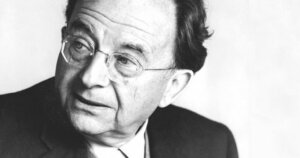Erich Fromm: Biography of the Founder of Humanist Psychoanalysis

If you’re not a specialist in psychology, when psychoanalysis is mentioned, you’ll probably only think of the figure of Sigmund Freud. However, today we’re going to talk about Erich Fromm (Frankfurt, 1900 – Muralto, 1980). He was the founder of humanist psychoanalysis.
When psychoanalysis was finally established in Europe, other proposals based on this trend gradually appeared, but with different perspectives. If you want to know more about the founder of humanistic psychoanalysis, read on.
The biography of Erich Fromm
Erich Fromm came from an Orthodox Jewish family. For this reason, during his youth, he began to train in Talmudic studies. Nevertheless, he wasn’t completely convinced by the subject and went down another path. In fact, he was inspired by Sigmund Freud’s theories of psychoanalysis and the thoughts of Karl Marx. These were two figures who brought him closer to socialism. Furthermore, they influenced him to the point that he obtained a doctorate in sociology.
In addition, Fromm also studied law. He trained at the universities of Heidelberg and Munich. During the 1930s, when the Nazis took control of Germany, he moved to New York. There, he opened a clinical practice based on psychoanalysis. He began teaching at Columbia University.
From that moment on, he developed psychoanalysis with strong influences from humanist philosophy. It was based on the ability of human beings to gradually become more free and autonomous through their own personal development.
Personal Interests and Inspirations
Erich Fromm’s interests were especially focused on creating a new ‘science of man’ capable of guiding a balanced individual amidst cultural chaos, violence, and loneliness. His ideas were nurtured by:
- Marx’s work.
- Freud’s theory.
- Zen Buddhism and its notion concerning enlightenment. This was understood as the development of the intuitive qualities of man.
First steps towards humanistic psychoanalysis
As Milagros and Dolores Sáiz explained, when psychology emerged in the second half of the 19th century, the first generation of researchers made an effort to understand the functioning of mental processes. However, it wasn’t until the consolidation of psychoanalysis in Europe that psychologists put aside the problems related to the life trajectory, the past, and the future.
In this way, psychoanalysis opened a more philosophical approach to psychotherapeutic practice. Using this approach, Fromm started to develop a more humanistic vision.
Humanistic psychoanalysis
For Fromm, the human psyche couldn’t only be explained with cultural or environmentally created images that betray unconscious desires. As a matter of fact, according to his thinking, which coincided in some ways with the existentialists, to understand it you also have to know how the human being strives to find the meaning of life. He claimed that:
- Life isn’t necessarily a field strewn with suffering. In fact, the optimism of his humanistic vision wasn’t expressed through the denial of pain, but through the idea of enduring it by giving it meaning.
- The ability to love is basic. Each person is unique in their mistakes, just as they are in what they’re able to contribute.
These thoughts may seem difficult to achieve in practice. Nevertheless, as described in his book, The Art of Loving: An Enquiry into the Nature of Love (1982), the objective of these two missions is to develop a love for life itself. Also, toward oneself.

The importance of needs
Fromm based his analysis of society on the concept of the social unconscious (the repressed part, according to Freud). Therefore, according to his thoughts, the realization of love, justice, and freedom will be achieved when the needs of man are satisfied.
For this reason, each individual must strive to satisfy their own desires. However, they must be careful not to become robots. Otherwise, by enduring a meaningless and goalless life, they’ll end up destroying themselves
All cited sources were thoroughly reviewed by our team to ensure their quality, reliability, currency, and validity. The bibliography of this article was considered reliable and of academic or scientific accuracy.
- Fernández, Tomás y Tamaro, Elena. «Biografia de Erich Fromm». En Biografías y Vidas. La enciclopedia biográfica en línea [Internet]. Barcelona, España, 2004. Disponible en https://www.biografiasyvidas.com/biografia/f/fromm.htm [fecha de acceso: 1 de diciembre de 2021].
- Fromm E. El Arte de Amar: Una Investigacion Sobre la Naturaleza del Amor. Ediciones Paidos Iberica; 2012.
This text is provided for informational purposes only and does not replace consultation with a professional. If in doubt, consult your specialist.








